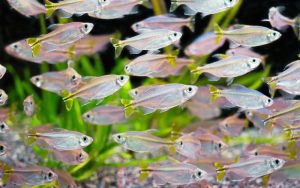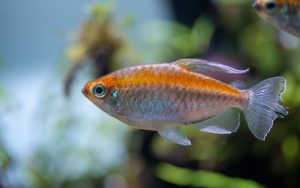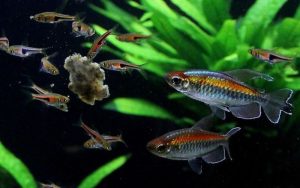What are the ideal betta fish water parameters? Betta fish, also known as Siamese fighting fish, are a popular choice for many aquarium enthusiasts due to their vibrant colors and unique personalities.
However, in order to keep these beautiful fish healthy and happy, it is essential to maintain optimal water parameters for fish in their tank. Ideal betta fish water parameters: Temperature 78-80°F (25-27°C), pH 6.5-7.5, ammonia and nitrite at 0 ppm, nitrate under 20 ppm. Maintain stable conditions to prevent stress.
In this betta fish care guide, we will explore five easy tips for maintaining the best possible water conditions for your betta fish.
From the proper water temperature to the ideal pH levels, we will cover everything you need to know to ensure that your bettas thrive in their environment.
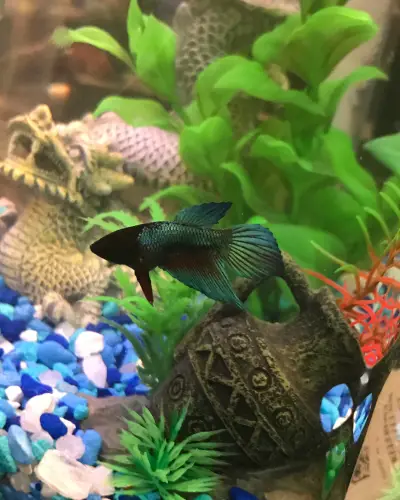
By following these simple guidelines, you can help your betta fish maintain their vibrant colors and active behavior while also preventing potential health issues.
Whether you are a beginner or an experienced betta fish owner, these tips will provide valuable insight into creating a thriving and beautiful habitat for your beloved fish.
So, let’s dive into the world of ideal betta water parameters gh, kh and learn how to create the perfect environment for these stunning creatures!
Table of Contents
ToggleWhat Kind of Water for Betta Fish?
Betta fish are native to the shallow waters of Southeast Asia. This environment is warm, slow-moving, and often contains a lot of vegetation. Therefore, when it comes to their tank water, betta fish require specific conditions for optimal health. It is recommended to use clean, dechlorinated water that is slightly acidic to mimic their natural habitat.
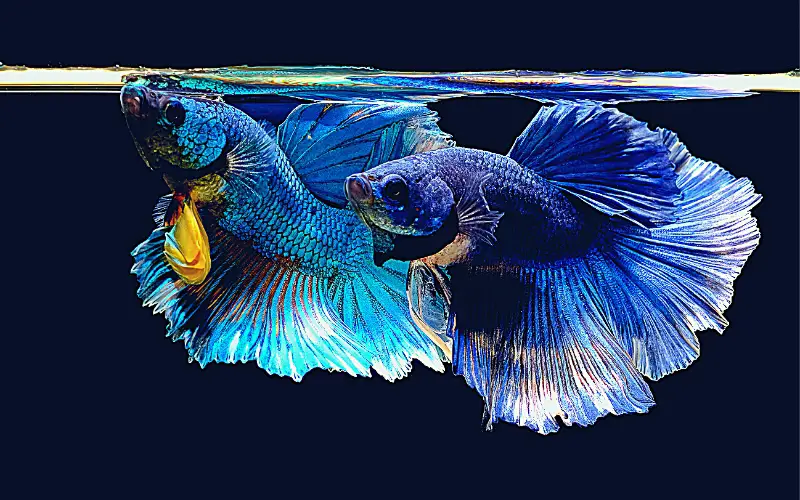
Betta fish are sensitive to changes in water temperature and pH levels, so it’s essential to monitor and maintain the water quality regularly. It’s also important to avoid using distilled water, as it lacks essential minerals that bettas need for their health.
A water conditioner can be used to eliminate harmful chemicals and metals found in tap water, providing a safe and suitable environment for betta fish. Ultimately, the best kind of water for betta fish is one that closely resembles the conditions of their natural habitat in Southeast Asia.
The Ideal Betta Fish Water Parameters:
The ideal water parameters for betta fish are crucial for their health and well-being. Betta fish thrive in warm water, with a temperature range of 78-80°F (25-27°C) being the most suitable.
The water should also have a slightly acidic to neutral pH level, ideally around 6.5-7.5. It is vital to keep the water clean and well-filtered, as bettas are sensitive to ammonia and nitrites.
A well-cycled tank with zero ammonia and nitrites is essential for their survival. Additionally, betta fish prefer soft to moderately hard water, with a dGH (general hardness) of around 5-15.
Providing a betta fish ideal water parameters can help prevent stress and disease and promote their overall health and happiness. It is crucial for betta fish owners to regularly test the water in the tank and maintain these betta fish tank parameters to ensure the well-being of their beloved pets.
Here are the best betta fish parameters for Vibrant Bettas!
- Temperature: 75°F – 81°F (23.8°C – 27.2°C) – Warm and stable is critical!
- Ammonia & Nitrite: 0 ppm – These waste products are toxic; aim for zero!
- Nitrate: <20 ppm – Keep nitrate levels low to prevent stress and illness.
- pH: 6.5 – 7.5 – Slightly acidic to neutral is ideal.
- General Hardness (GH): 3-4 dGH (50-66.7 ppm) – Soft to moderately hard water preferred.
- Carbonate Hardness (KH): 3-5 dKH (53.6- 89.4 ppm) – Provides buffering capacity for stable pH.
- Water Changes: 25-50% weekly – Maintain water quality by removing fish waste and replenishing minerals.
Additional Tips:
- Use a thermometer and heater to maintain the ideal temperature.
- Test the water regularly with a test kit or strips.
- Use a water conditioner to treat tap water.
- Provide gentle water flow and filtration.
- Avoid sudden changes in water parameters.
By following these guidelines, you can create a healthy and thriving environment for your betta fish!
Remember, consistency and stability are essential for optimal betta health. Keep your betta parameters within these ideal ranges, and your finned friend will thank you!
Why Is Water Type Important for Betta Fish?
The right water type is crucial for betta fish because it directly impacts their health and well-being in several ways:
Physiology: Bettas, like all fish, absorb water and minerals through their gills and skin. The correct betta tank parameters, such as pH, hardness, and mineral content, ensure they can adequately regulate their internal body fluids and functions. Improper water can lead to electrolyte imbalances, organ dysfunction, and even death.
Stress: Fluctuations or imbalances in water parameters can be very stressful for bettas. This can weaken their immune system, making them more susceptible to diseases and infections. Stable, ideal water conditions help them thrive and resist illness.
Behavior: Bettas are known for their vibrant colors and active personalities. Proper water quality supports their natural behaviors, like swimming, foraging, and displaying their fins. Poor water conditions can make them lethargic, withdrawn, and less likely to show their full potential.
Reproduction: If you’re planning to breed bettas, water quality becomes even more critical. The correct betta parameters, exceptionally stable pH and temperature, are essential for successful spawning and healthy fry development.
Can Bettas Live in Tap Water?
In short, yes, bettas can live in tap water, but only if it’s treated first. Untreated tap water contains chlorine and chloramine, which are harmful to bettas. These chemicals can damage their gills, fins, and internal organs.
Here’s how to make tap water safe for your Betta:
- Use a water conditioner. A good water conditioner will neutralize chlorine and chloramine, as well as remove heavy metals and other harmful chemicals.
- Let the water sit for 24 hours. If you don’t have a water conditioner, you can let the tap water sit for 24 hours. This will allow the chlorine to evaporate. However, this method won’t remove chloramine or other harmful chemicals.
Once the water is treated, you can add it to your Betta’s tank. With a bit of care, you can use tap water to provide your Betta with a healthy and happy home.
Why You Need A Rimless Aquarium Tank?
A rimless aquarium tank is an excellent option for betta fish because it provides an unobstructed view of the fish, creating a more natural and visually appealing environment.
The lack of a rim also makes it easier to clean and maintain the tank, as there are no nooks and crannies for debris to get trapped in.
Additionally, betta fish are known for their love of exploring every nook and cranny of their environment, and a rimless tank allows them to do just that without any barriers.
The sleek, modern design of a rimless tank can also be a beautiful addition to any home or office, adding a touch of sophistication to the space.
Overall, a rimless aquarium tank is a practical and aesthetically pleasing choice for betta fish that allows you to fully enjoy the beauty and behavior of these vibrant and engaging creatures.
Veterinary Care for Betta Fish:
While bettas are hardy fish, they can still require veterinary care for various reasons. Unfortunately, due to their small size and relatively low cost, specialized veterinary care for bettas is less widely available than it is for larger pets. However, there are still steps you can take to ensure your Betta receives the best possible care if they fall ill.
Here are some signs that your Betta may need veterinary attention:
- Changes in behavior: Lethargy, loss of appetite, difficulty swimming, or hiding are all potential signs of illness.
- Physical abnormalities: Fin or tail clamping, popeye (bulging eyes), body sores, or unusual growths are all cause for concern.
- Water quality issues: Ammonia or nitrite spikes, sudden changes in pH, or cloudy water can all stress your Betta and make them more susceptible to illness.
If you notice any of these signs, it’s essential to take your Betta to a veterinarian as soon as possible. Ideally, you should find a veterinarian with experience treating fish. However, if that’s not possible, any veterinarian familiar with aquatic animals can help.
5 Crucial Betta Water Parameters Tips for a Thriving Betta Tank
Keeping your Betta happy and healthy boils down to 5 key water parameters:
1. Temperature: Bettas crave warmth! Aim for 78°F – 82°F (25.5°C – 27.8°C). Use a thermometer and heater to maintain stability, avoiding sudden swings.
2. Ammonia & Nitrite: These waste products are toxic; aim for 0 ppm. Regular water changes (25-50% weekly) and good filtration prevent buildup.
3. Nitrate: Less toxic but still stressful. Keep levels below 20 ppm with consistent water changes.
4. pH: Bettas prefer slightly acidic to neutral water, 6.5 – 7.5. Test regularly and adjust with pH buffers if needed. Avoid drastic changes.
5. Hardness: Soft to moderately hard water is best. Aim for GH 3-4 dGH, KH 3-5 dGH. Tap water may be suitable after treatment; check your local water report.
Bonus Tips:
- Monitor regularly: Test betta tank parameters weekly to stay ahead of problems.
- Conditioner is vital: Treat tap water to remove harmful chlorine and chloramine.
- Gentle flow: Provide gentle water flow and filtration without overwhelming your Betta.
- Stable is best: Avoid sudden changes in any parameter; consistency is critical for betta health.
By mastering these five crucial water parameters, you’ll create a thriving environment where your Betta can flourish! Remember, a happy and healthy betta means vibrant colors, energetic swimming, and a longer lifespan for your finned friend.
What If Your Water pH Level Is Not Right?
If your water pH level needs to be corrected, it can have a significant impact on many aspects of your daily life.
For example, if the pH level is too high, it can lead to an increased risk of limescale buildup in your pipes and appliances, which can reduce their lifespan and efficiency.
On the other hand, if the pH level is too low, it can make the water more acidic, potentially leading to corrosion of metal pipes and fixtures.
Additionally, the taste and smell of your water can be affected, which can make it less enjoyable to drink or use for cooking. Furthermore, a low or high pH level in water can also have negative effects on your skin and hair when bathing or showering.
Therefore, it is crucial to regularly test and monitor the pH level of your water and take appropriate measures, such as using a water filtration system or adding pH-balancing chemicals, to ensure that it is within the optimal range for your health and comfort.
best water parameters for betta fish Temperament and Tank Mates
Here are the optimal water parameters for keeping your betta fish happy and healthy:
Temperature: 75°-81°F (23.8°-27.2°C). Bettas are tropical fish and require warm water. Use an aquarium heater to maintain a consistent temperature within this range and avoid fluctuations.
Ammonia and Nitrite: 0 ppm. Both ammonia and nitrite are toxic to fish and should be undetectable in a healthy tank. An adequately cycled aquarium will convert waste into these compounds and further break them down into less harmful nitrates.
Nitrate: <20 ppm. While not as toxic as ammonia or nitrite, high nitrate levels can still stress your Betta. Weekly water changes of 10-20% will help keep nitrates under control.
pH: 6.5-7.5. This is a slightly acidic to neutral range. While bettas can tolerate a broader range, maintaining a stable pH within this range is vital for their health. Avoid drastic pH changes with chemicals.
General Hardness (GH): 3-4 dGH (50-66.7 ppm). Moderately hard water is ideal for bettas. gh levels for betta fish affects the buffering capacity of water and helps maintain a stable pH.
Carbonate Hardness (KH): 3-5 dKH (53.6- 89.4 ppm). Similar to betta fish GH level, KH helps maintain a stable pH. Aim for a moderate kh level for betta within this range.
Additional Tips:
- Use a water conditioner to remove chlorine and chloramines from tap water.
- Perform regular water changes to remove waste products and prevent nitrate buildup.
- Provide gentle filtration to maintain good water quality without creating solid currents.
Temperament and Tank Mates
Bettas are generally known for their territoriality, especially against other male bettas. However, they can be suitable tank mates for some peaceful fish species, provided certain conditions are met:
Suitable Tank Mates:
- Small, schooling fish: Neon tetras, harlequin rasboras, ember tetras, guppies (females only)
- Bottom feeders: Corydoras catfish, shrimp
- Snails: Mystery snails, nerite snails
Factors for Successful Cohabitation:
- Tank size: A larger tank (10 gallons or more) provides more space for different species to establish territories and avoid conflict.
- Hiding places: Plenty of live plants, rocks, and decorations are essential for providing hiding spots for fish to retreat to if they feel threatened.
- Monitoring: Start with a small number of tank mates and carefully observe the interactions between them. Introduce new fish slowly and be prepared to separate them if aggression arises.
Not Suitable Tank Mates:
- Large or aggressive fish: Gouramis, cichlids, goldfish
- Fin-nipping fish: Barbs, nippy tetras
- Male bettas
Remember: Even with suitable tank mates, it’s always best to monitor your Betta closely and be prepared to adjust the setup if necessary. Some bettas may not tolerate any tank mates, while others can thrive in a peaceful community.
Setting up a Betta Fish Aquarium for Optimal Care
Setting up a Betta fish aquarium for optimal care requires careful consideration of the tank size, water quality, and décor. A minimum of 5 gallons is recommended for a Betta fish tank, as these fish require ample space to swim and explore.
It’s essential to use a filtration system to keep the water clean and maintain proper betta parameters, including temperature, pH level, and ammonia levels. Live or silk plants can provide hiding spots and resting places for the Betta fish while also helping to maintain water quality.
When setting up the aquarium, it’s vital to ensure that the water is dechlorinated and at the right temperature before introducing the fish. Additionally, be mindful of the tank’s placement, keeping it away from direct sunlight and drafts.
Regular water changes and maintenance are crucial for the overall health and well-being of the Betta fish, making it essential to establish a routine for cleaning and care.
Commonly Asked Questions about The Best type of Water for Your Betta fish Tank (FAQs)
What kind of water to use for your betta fish?
Use treated tap water or bottled spring water for your Betta. Avoid distilled or rainwater, as they lack needed minerals. Always dechlorinate before adding to the tank!
Do Betta fish like hard or soft water?
While Bettas can adapt to a range, they generally prefer soft, slightly acidic water, like their native rice paddy homes. Hard water isn’t harmful, but stability is critical!
Do Betta fish need water conditioner?
Yes, betta fish absolutely need water conditioner! Tap water contains chlorine and chloramine, which are harmful to fish. A good water conditioner will neutralize these chemicals, as well as heavy metals that can be present in water sources.
Is Distilled Water Suitable for Bettas?
is distilled water good for betta fish? No, distilled water is not suitable for betta fish. While it’s free of harmful chemicals, it also lacks essential minerals. Use treated tap water or aquarium water during partial water changes for freshwater fish.
Can Betta fish live in tap water?
Is tap water OK for betta fish? Bettas can survive in treated tap water, but it’s not ideal for aquarium fish. Chlorine and chloramine in new water can kill your Betta. Always use a water conditioner to neutralize these chemicals before adding them to your Betta’s tank! This ensures the water is safe and keeps your aquarium buddy healthy.
What water parameters do betta fish need?
Bettas thrive in warm, stable water: 76-82°F, pH 6.5-7.5, ammonia & nitrite at 0 ppm, & nitrate below 20 ppm. Avoid distilled or rainwater, as they lack minerals. Opt for treated tap water, spring water, or remineralizer reverse osmosis water for healthy fish and a stable tank environment.
What is the ideal GH for betta fish?
What should the GH level for betta be? While adaptable, the new Betta prefers soft water, ideally a GH below 8 dGH (or 130 ppm). If your tap water is harder, consider using RO water with mineral supplements or adding Indian almond leaves to the tank to lower the GH and pH naturally.
How do I lower the GH in my betta tank?
For softer water for your new Betta, try partial water changes with low-GH spring water or RO water, add Indian almond leaves to naturally lower betta GH level and pH, or consider a reverse osmosis (RO) system with remineralization for long-term control.
What environment does a betta fish need?
Betta fish thrive in a warm, filtered aquarium (at least 5 gallons) with stable water conditions. Maintain a temperature between 78-80°F, provide hiding spots, and avoid placing them with aggressive tank mates.
Where is the best place to put a betta fish tank?
Warm, calm tank (5+ gallons, 75-82°F). Use treated tap/spring water with a stable pH (6.5-7.5). Use gentle filter, live/silk plants, and avoid sharp décor. Peaceful tankmates are optional. Let them breathe from the surface of the water!
How do I lower the pH in my water?
To lower the pH for a betta water, use natural methods like adding driftwood or peat moss to the aquarium. Alternatively, commercial pH-lowering products are available. Regular monitoring ensures a stable environment for your fish.
How much water does a male betta fish need?
While the minimum recommended tank size for a male betta fish is 5 gallons, providing more space is always better for their well-being! Think of it as giving them more room to explore, swim, and express their natural behaviors.
How often does a betta fish poop?
A healthy betta fish will usually poop once or twice a day, depending on factors like feeding and water temperature. Their tiny droppings, often resembling dark specks or rice grains, can disintegrate quickly, making them harder to spot.
Do betta fish need beneficial bacteria?
While Betta fish themselves don’t directly “need” beneficial bacteria, a healthy tank absolutely does! These microscopic heroes break down harmful fish waste like ammonia and nitrite, preventing them from reaching toxic levels that could sicken your Betta.
How do you remove uneaten food from a betta tank?
Use a siphon or small net to remove uneaten food from a betta tank. Regular maintenance, such as gentle vacuuming during water changes, helps keep the tank clean and maintains water quality.
Conclusion
In conclusion, understanding and maintaining the ideal betta water parameters api is crucial for the health and vibrancy of your beloved aquatic companions. By implementing the five easy tips we’ve shared, you can create an optimal environment that promotes their well-being. Remember to change the water regularly and adjust the temperature, pH levels, and filtration system to ensure a stable and comfortable habitat for your bettas. Additionally, providing them with appropriate space, a balanced diet, and regular water changes will contribute to their overall happiness.
By prioritizing your betta fish water parameters, you’ll witness the stunning transformation of your betta fish, showcasing their vibrant colors and energetic personalities. So dive in and create a haven for your bettas with these essential betta fish tank parameters!
You might also like
- Maintaining The Ideal Ph for Betta Fish Aquarium (Solved!)
- The Ideal Betta Fish Water Temperature: (One Secret Digit!)
- Betta Fish Habitat in the Wild: (Facts & Shocking Truths)
- How Often to Change Betta Water Without Filter: (5 Pro Tips)
- 7 Steps on How to Save Dying Fish After Water Change (FAQ)
- What Size Tank for Betta Fish Is the Best? (Figure It Out!)
- Effective Popeye Betta Treatments: (Tips and Tricks)
- Are Female Bettas Aggressive: (Fun Facts & Helpful Tips)
- Do Betta Breathe Air for Extra Abilities (Unveiled)


